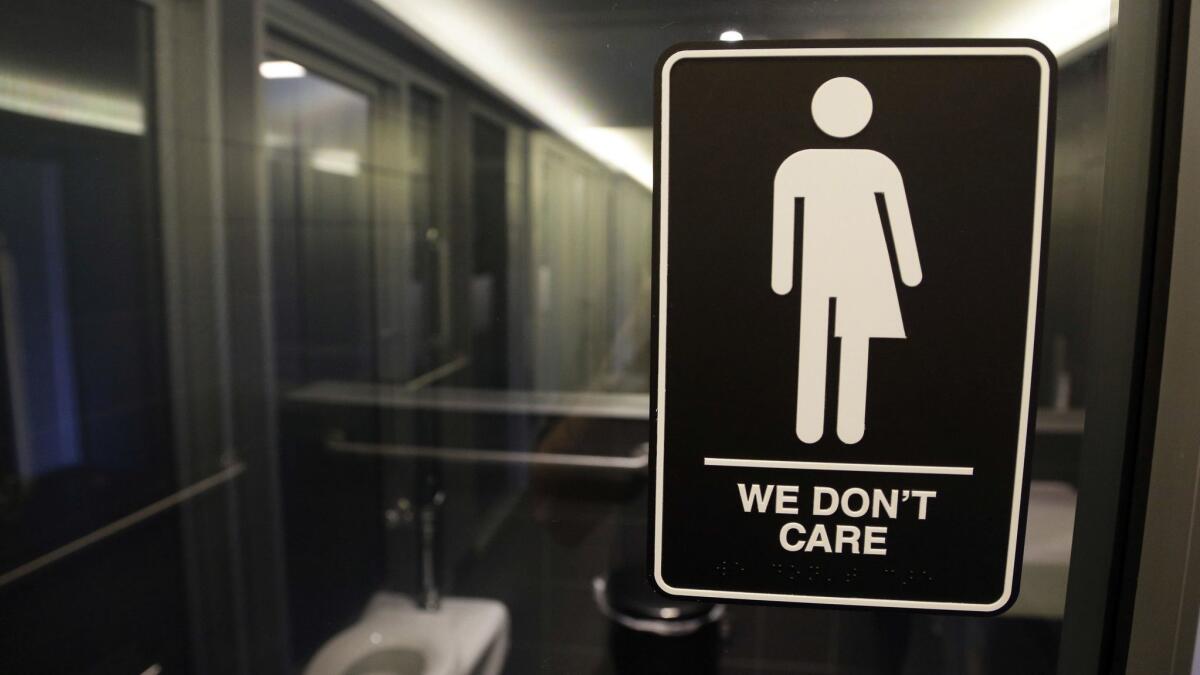Transgender rights battle returns to North Carolina courts

- Share via
Reporting from Raleigh, N.C. — More than a year after North Carolina undid its “bathroom bill,” a legal battle now is simmering over a law that replaced it.
A federal judge on Monday will hear arguments from transgender advocates who claim in a lawsuit that the replacement law still discriminates against the LGBTQ community. For their part, Republican leaders in the North Carolina General Assembly are fighting to have the lawsuit dismissed.
The replacement law, passed in 2017, was intended to quell the furor that arose when the state in 2016 passed House Bill 2, which required transgender people to use restrooms in many public buildings that corresponded to the sex assigned to them at birth.
The replacement law did away with that requirement, but it also spelled out who was in charge of making such bathroom rules in the first place: state lawmakers — and not local governments. The new law also prohibited local governments from enacting new nondiscrimination ordinances for workplaces, hotels and restaurants until December 2020.
The lawsuit claims the replacement law still hurts transgender people by creating ambiguity about restroom access and preventing local officials from providing clarity or passing laws to protect LGBTQ rights. The GOP leaders argue, however, that the new law doesn’t deprive the LGBTQ community of legal protections and that any uncertainty over bathroom rules doesn’t amount to legal harm.
The replacement law wasn’t met with enthusiasm, but it appeared to be a compromise that helped dim the harsh spotlight that had been cast on the state for its handling of LGBTQ rights.
“It really only satisfied the people who wanted to get it off the headlines. And I think it was successful in that,” said Chris Cooper, a political science professor at Western Carolina University.

After the original “bathroom bill” was enacted in 2016, company leaders halted or delayed plans to bring thousands of jobs to North Carolina in response to a boycott campaign. Major sporting events pulled out of the state.
But since the compromise last year, the state has again become an attractive location for out-of-state corporations. And the NBA, NCAA and Atlantic Coast Conference have decided to bring back championship events.
Tami Fitzgerald, executive director of the conservative NC Values Coalition, said her group thinks the replacement law is working and creates a business-friendly environment by giving businesses the flexibility to set their own policies. Her group, which supported House Bill 2, hopes lawmakers will extend the moratorium on new local nondiscrimination ordinances past 2020.
Further, she said, she believes most parents around the state share her concerns about privacy.
“The majority of parents want their children to be free from confronting a person of the opposite sex in their bathroom, their shower or their locker room,” she said.
However, Chris Brook of the American Civil Liberties Union of North Carolina said there’s “nothing hypothetical” about the harm caused by the current law, known as HB 142.
“There’s evidence in the record that students in the public school system have been told by their schools that HB 142 makes it illegal for them to utilize the restroom that accords with their gender identity,” said Brook, who is representing the transgender plaintiffs.
The plaintiffs are urging the judge to consider the plight of a transgender elementary student from Wilmington who’s barred from using the girls’ bathrooms.
The girl’s mother, Ericka Myers, said in court documents that doctors have recommended her daughter live as a female in all aspects of her life. But Myers said the principal told her in 2017 that it was illegal for her daughter, then 8, to use the girls’ bathrooms.
The girl was offered use of a nurse’s restroom or one in the teacher’s lounge, but Myers said that her daughter feels humiliated and singled out for being “the only student forced to use them.”
New Hanover County Schools issued a statement declining to comment on Myers’ account, but said the district works individually with students to accommodate their needs.
More to Read
Sign up for Essential California
The most important California stories and recommendations in your inbox every morning.
You may occasionally receive promotional content from the Los Angeles Times.










